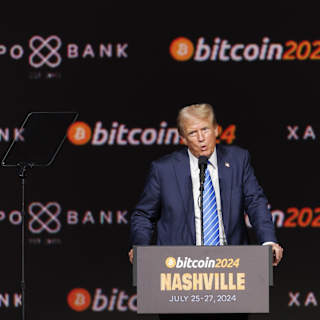- Government Tests Waters with Coinbase Prime Transfer
- Policy Implications Under New Administration
- Broader Regulatory Landscape
The U.S. government transferred $219,000 worth of Ethereum to Coinbase on July 7, marking the first such move to a cryptocurrency exchange since the Trump administration began implementing its pro-crypto agenda. The transfer has sparked market concerns about potential liquidation and raised questions about how the government will manage its seized digital assets under new policy frameworks.
The move comes as the administration develops a Strategic Bitcoin Reserve and considers broader changes to cryptocurrency oversight, creating uncertainty about whether seized assets will be sold or held as part of a national digital stockpile.

A wallet labeled "US Government: FBI" transferred 86.56 ETH to a Coinbase Prime deposit address, following a $10 test transaction that preceded the larger movement, according to Arkham Intelligence12. The Ethereum originated from assets seized from Chase Senecal, known online as "Horror," during a 2022 enforcement action involving NFT scams and digital asset fraud12.
Coinbase Prime, designed for institutional clients, allows large-scale cryptocurrency sales without immediate disruption to public order books3. The platform choice suggests the government may be preparing for controlled liquidation rather than market sales, though no official confirmation has been provided2.
Ethereum traded around $2,534 at the time of the transfer, remaining relatively stable despite market speculation about potential government selling pressure2. The government wallet still holds over 100,000 ETH from the original seizure24.
The transfer represents a notable shift from the government's previous approach to seized cryptocurrency assets. Under President Biden, the federal government regularly liquidated Bitcoin holdings, with transfers to exchanges serving as early warning signs of sales1. However, the Trump administration has proposed creating a U.S. Crypto Reserve that would include altcoins like Ethereum1.
An executive order signed in January 2025 established the Strategic Bitcoin Reserve and United States Digital Asset Stockpile, directing that government Bitcoin "shall not be sold and shall be maintained as reserve assets"2. The order created a working group to develop a comprehensive federal regulatory framework for digital assets within 180 days3.
The Trump administration has moved to dismantle previous crypto enforcement mechanisms, disbanding the Department of Justice's National Cryptocurrency Enforcement Team and directing the SEC to drop major lawsuits against companies like Coinbase1. This deregulatory approach aims to encourage innovation while raising concerns about consumer protection and oversight1.
The government's choice to move Ethereum to an exchange platform, despite creating a strategic reserve framework, highlights the ongoing tension between asset liquidation and retention policies. The methodical approach, including the test transaction, suggests careful consideration of market impact while leaving the ultimate purpose unclear.



